|
|
|
Sort Order |
|
|
|
Items / Page
|
|
|
|
|
|
|
| Srl | Item |
| 1 |
ID:
127707
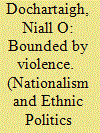

|
|
|
|
|
| Publication |
2013.
|
| Summary/Abstract |
This article analyzes the relationship between territoriality and organized violence through an examination of two relatively understudied aspects of the production and reproduction of informal territorial boundaries in situations of violent conflict. It looks first at the role of the state in the establishment, maintenance, and institutionalization of substate territories associated with challengers, outlining how these bounding processes are generated through interaction between the state and challengers, rather than primarily through the actions of challengers. Secondly, it explores the shaping force of geopolitical contexts on the everyday maintenance of informal boundaries in conflict situations. The argument is illustrated with examples from the most recent period of violent conflict in the north of Ireland, drawing on a range of primary sources, including official and private papers. The article argues that an analysis that gives due recognition to the central role of the state and the importance of the geopolitical context in the delineation and institutionalization of substate territories associated with armed challengers can help us to better understand the dynamics of organized violence.
|
|
|
|
|
|
|
|
|
|
|
|
|
|
|
|
| 2 |
ID:
127670
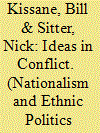

|
|
|
|
|
| Publication |
2013.
|
| Summary/Abstract |
The comparative study of civil war has recently gone through a "structural turn," towards large-n quantitative studies that explain the variation in the incidence of civil wars in terms of structural factors. The alternatives have been a return to case studies and a constructivist critique that emphasizes the role of ideas in conflict. While there is no a priori reason to reconcile these approaches, it remains a practical task for those who want to understand how a given social situation escalates into civil war. After reviewing the two poles in the debate, we mine the literature on nationalism for insights into this issue.
|
|
|
|
|
|
|
|
|
|
|
|
|
|
|
|
| 3 |
ID:
127666
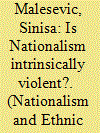

|
|
|
|
|
| Publication |
2013.
|
| Summary/Abstract |
This article analyzes the complex and contradictory relationships between nationalism and organized violence. The author challenges the approaches that see nationalism as being inherently linked with violence and demonstrates that nationalist ideology by itself is rarely a main cause of hostile acts. The article focuses on the different forms of organized violence including wars, revolutions, terrorism, and genocide. It aims to show that the relationship between violence and nationalism cannot be properly captured by the dominant intentionalist, naturalist, and formativist perspectives. Instead the case is made that the emphasis should be given to the long-term historical processes and the relative modernity of both nationalism and organized violence. The author argues that it is very difficult to generate sustained and organized violent nationalist action. The mutation of nationalist doctrines into violent acts is generally a product of unintended structural circumstances and is characterized by its temporary nature and volatility. More specifically, this process is usually generated by the coercive bureaucratization, centrifugal ideologization, and their capacity to be embedded in the networks of microsolidarity.
|
|
|
|
|
|
|
|
|
|
|
|
|
|
|
|
| 4 |
ID:
127705
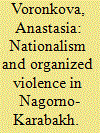

|
|
|
|
|
| Publication |
2013.
|
| Summary/Abstract |
This article analyzes the relationship between nationalism, territory, and organized violence in the ethnonational contestation over Nagorno-Karabakh. Drawing on new empirical material, I highlight discursive, perceptual, and representational aspects of territoriality that contribute to conflict intractability. I argue that a consideration of these dimensions has the potential to provide a fuller explanation of territorial rigidity than a single focus on the indivisibility of territory. The article further questions strong versions of "ethnic entrepreneurship" accounts. I advocate a perspective that considers the microsocial context of the shift to violent strategies. Oral narratives and their reinterpretation via interpersonal networks are highlighted as key mechanisms of individual radicalization.
|
|
|
|
|
|
|
|
|
|
|
|
|
|
|
|
| 5 |
ID:
127654
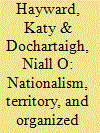

|
|
|
|
|
| Publication |
2013.
|
| Summary/Abstract |
Recent decades have seen significant advances in research on the relationship between nationalist ideology and organized violence. New scholarship has paid much closer attention to the microdynamics of violence, the strikingly uneven distribution of violence, the relationship between master cleavages and intimate local and personal struggles, and to process, history, and contingency. Nationalist ideology is understood to be bound up intimately with institutions and with everyday relationships at the local level. We introduce the contributions to this special issue, outlining the way in which they highlight the power of ideas, narratives, and microlevel solidarity in mobilization for violence and how they address the crucial importance of territoriality in linking ideas and action.
|
|
|
|
|
|
|
|
|
|
|
|
|
|
|
|
| 6 |
ID:
127692
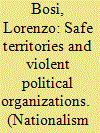

|
|
|
|
|
| Publication |
2013.
|
| Summary/Abstract |
This article assesses how the concept of safe territory can expand our understanding of the persistence of, and eventual disengagement from, violence by violent political organizations. The explanatory utility of this concept is demonstrated through an analysis of the cycles of political violence perpetrated by the Red Brigades in Italy and the Provisional Irish Republican Army in Northern Ireland. This work offers two main illustrative hypotheses. First, the opportunities provided by safe territories are not necessarily conducive to the continuation of political violence, although they facilitate its persistence over a long period of time. Second, the presence of safe territories, regardless of the ideology of the violent political organization, tends to enforce disengagement from political violence at the group, rather than the individual, level. Finally, the analytical intent in introducing the concept of safe territory is to contribute to spatial understandings of political violence.
|
|
|
|
|
|
|
|
|
|
|
|
|
|
|
|
| 7 |
ID:
127676


|
|
|
|
|
| Publication |
2013.
|
| Summary/Abstract |
From (at least) the Balfour Declaration of 1917 right down to the present day, the Zionist-Palestinian conflict has been sculpted by external forces. But never entirely so: grassroots patterns of confrontation have also been vital. This article therefore adopts a "bottom-up" approach to the evolution of the conflict since the early twentieth century.
|
|
|
|
|
|
|
|
|
|
|
|
|
|
|
|
|
|
|
|
|